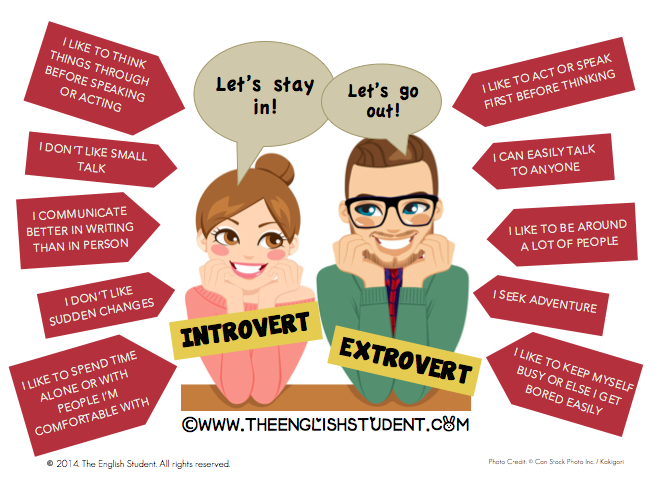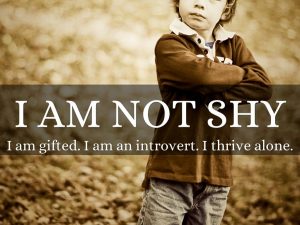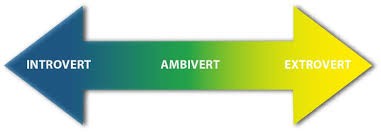What are you: An introvert, an Extrovert or an Ambivert?
 There’s nothing wrong with being shy. The world needs some quiet, thoughtful, introspective people. It takes all sorts of people to make the world a beautiful place. There are some people who are reserve; they don’t shoot off their mouths every now and then. They think before they ask questions. We should understand that people who are reluctant to interfere and careful not to offend others are not weak people. If somebody appears shy, that person is not a weakling. If you are shy be proud of it. Many people are shy in the world. Their shyness prevents them from expressing themselves, from making friends, and from enjoying life to its fullest. And, for some people, shyness is a cocoon. They feel safe and warm and quiet inside their cocoon. They confine their world to the cocoon but it’s wrong to assume that they are lonely in there.
There’s nothing wrong with being shy. The world needs some quiet, thoughtful, introspective people. It takes all sorts of people to make the world a beautiful place. There are some people who are reserve; they don’t shoot off their mouths every now and then. They think before they ask questions. We should understand that people who are reluctant to interfere and careful not to offend others are not weak people. If somebody appears shy, that person is not a weakling. If you are shy be proud of it. Many people are shy in the world. Their shyness prevents them from expressing themselves, from making friends, and from enjoying life to its fullest. And, for some people, shyness is a cocoon. They feel safe and warm and quiet inside their cocoon. They confine their world to the cocoon but it’s wrong to assume that they are lonely in there.
Most people are shy to some degree. Extreme shyness may be something one would want to look a bit closely at but equally disturbing would be extreme extroversion. There is a social norm and fewer people fall someplace in the middle. But let us assume a person enters a party and the spotlight is thrown on him and he is asked to give a speech or sing and he feels uncomfortable it cannot be called extreme shyness.
When you think of someone being shy, you probably don’t think of celebrities who are always in the spotlight. But, surprisingly the list consists of people like Abraham Lincoln, Mahatma Gandhi, Bill Gates and Albert Einstein. It seems Barrack Obama is of introvert personality but has leveraged introvert’s natural capacity for thoughtful communication. Warren Buffet is a classic example of an introvert taking careful, well-calibrated risks. Buffet is very thoughtful and likes to be in his own confined world. He is not flashy though he is counted among the richest people in the world. You might not expect the founder of the social network to be reserved, but Zuckerberg is a classic introvert. He is shy and introverted and he often does not seem very warm to people who don’t know him, but the fact is he is an affectionate person. The Yahoo CEO Marissa Mayer insists that the spotlight is not her style; she says that she is naturally shy and introverted and yet modern media ignores it and paints her as an extrovert instead.
Personality refers to an individual’s pattern of thoughts, feelings and behavior that make a person unique. There are multiple kinds of personalities whom we encounter in our day-to-day lives; some are strong, some are charismatic, open-minded, while some are withdrawn or shy. Carl Gustav Jung was a Swiss psychiatrist and founder of the school of analytical psychology. He proposed and developed the concepts of the extroverted and introverted personality, archetypes, and the collective unconscious. The issues that he dealt with occurred from his personal experiences. For many years Jung felt as if he had two separate personalities. One introverted and other extroverted. This interplay resulted in his study of integration and wholeness. Jung’s perspective on personality is quite insightful; he wrote that what appears to be random behavior is actually the result of differences in the way people prefer to use their mental capacities.
 Introverts are known for having fewer connections in their life, but these connections are usually much deeper. Extroverts think as they talk or let’s say that talk as they think. The process for introverts is much different and it’s so internal that you can’t make out outwardly that anything is happening. An introvert could be sitting in corner thinking about the meaning of life or could be solving some grave problem of his organization. Just because they are not more vocal about everything does not mean they are not passionate about life. Introverts feel things just as deeply as extroverts; the difference is that they are simply not very effusive about it. Perhaps their thinking process does not frequently involve others.
Introverts are known for having fewer connections in their life, but these connections are usually much deeper. Extroverts think as they talk or let’s say that talk as they think. The process for introverts is much different and it’s so internal that you can’t make out outwardly that anything is happening. An introvert could be sitting in corner thinking about the meaning of life or could be solving some grave problem of his organization. Just because they are not more vocal about everything does not mean they are not passionate about life. Introverts feel things just as deeply as extroverts; the difference is that they are simply not very effusive about it. Perhaps their thinking process does not frequently involve others.
It is known that introverts are quieter and tend to feel more energized from spending time alone, while extroverts are louder and gain fortification and energy from being around with others. Extroverts often exhibit qualities of charm, magnetism, and affiliation, while introverts tend to be creative and prefer to work alone. But it’s not always black and white: we all coexist on this planet – introverts and extroverts need to work together manifesting qualities of each depending on the circumstance. And, being an introvert doesn’t mean being a recluse: introverts can often be amiable social butterflies in their own quiet way.
 Introverts are born with great listening skills because they tend to think first, before voicing their opinions. They prefer understanding others before seeking to be understood, which indirectly helps them build good rapport with people. When others speak their mind freely, introverts listen carefully to have a good grasp of their perspectives and viewpoints. People generally feel much more at ease with opening themselves up when they see and feel the readiness of introverts to hear their point of view. In other words, introverts have flair of making others feel valued for expressing their opinions. They make great managers.
Introverts are born with great listening skills because they tend to think first, before voicing their opinions. They prefer understanding others before seeking to be understood, which indirectly helps them build good rapport with people. When others speak their mind freely, introverts listen carefully to have a good grasp of their perspectives and viewpoints. People generally feel much more at ease with opening themselves up when they see and feel the readiness of introverts to hear their point of view. In other words, introverts have flair of making others feel valued for expressing their opinions. They make great managers.
As it is also in their nature to consider carefully what to say before they actually open their mouths, writing seems to be a better communication channel than speaking since it grants them more time to consolidate their thoughts before they respond. For these reasons, introverts make good writers. World’s greatest playwright, poets and writers, like William Shakespeare, J. R. R. Tolkien, Emily Dickinson and J.K. Rowling are known to be introverts.
We all know introverts like spending time by themselves more so than extroverts, and few extroverts can understand such self-reliance. Carl Jung has explained that while extroverts require social stimulation to feel energetic, introverts like to recharge their energy by isolating themselves after intensive interactions. All in all, they do not seek other’s opinions and approvals to feel happy. One biggest fact about introverts is that you can confide your secrets in an introvert because they respect other’s feelings and are genuine in their actions.
 And, if you exhibit qualities of both introversion and extroversion then you are an Ambivert. Ambiverts typically slide up and down the gamut depending on the situation, context and people around them. Being able to balance both extroversion and introversion is an asset. Ambiverts can typically be adaptive to context and situations more easily. According to psychologist named Hans Eysenck, who coined the term “ambivert” in 1947, ambiverts offer a good balance between the hypersensitivity of some introverts and the domineering attitude of some extroverts. They are emotionally stable; they are more intuitive and are more influential. Every workplace, college, school, social gathering has representatives of each personality type, and the best thing to do is accommodate others and acknowledge the fact that each individual has his/her personality and respect the uniqueness of others.
And, if you exhibit qualities of both introversion and extroversion then you are an Ambivert. Ambiverts typically slide up and down the gamut depending on the situation, context and people around them. Being able to balance both extroversion and introversion is an asset. Ambiverts can typically be adaptive to context and situations more easily. According to psychologist named Hans Eysenck, who coined the term “ambivert” in 1947, ambiverts offer a good balance between the hypersensitivity of some introverts and the domineering attitude of some extroverts. They are emotionally stable; they are more intuitive and are more influential. Every workplace, college, school, social gathering has representatives of each personality type, and the best thing to do is accommodate others and acknowledge the fact that each individual has his/her personality and respect the uniqueness of others.













































